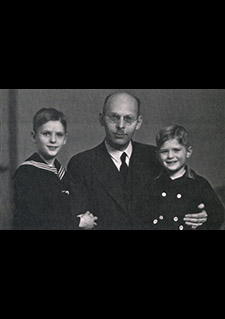Conflicts as a Confessing Church Pastor
After Nazi rule had ended, Aurel von Jüchen averred that, unlike many others, Werner Sylten stood by his convictions even after the Nazis assumed power January 30, 1933. He therefore also soon came into conflict with the radical German Christian Thuringian church government. He joined the Pastors’ Emergency League and, in 1934, the Lutheran Confessional Fellowship in Thuringia, which was opposed to the church government.
The Thuringian church government questioned him in January of 1934 because of his involvement in the Confessing Church’s protests against the German Christian Reich Bishop Ludwig Müller. In July of 1935, he undersigned a declaration in which the Lutheran Confessional Fellowship renounced its obedience the Thuringian church government in spiritual matters. He additionally aroused suspicion because of his sympathies for the religious socialists who considered Christianity and National Socialism to be irreconcilable. Moreover, the modern educational approach he practiced in the Thuringian Home for Girls was in stark conflict with the educational methods propagated by the National Socialists.
The mounting conflicts weighed upon Werner Sylten’s wife Hildegard so heavily that she took her own life in early 1935. Werner Sylten was also heavily burdened by worry that his Jewish ancestry might be discovered. Neither to the general public nor the Thuringian church government was aware of this. As is clear from Werner Sylten’s letter of June 27, 1935 to Alfred Fritz, Executive Director of the Protestant National Educational Association, he was driven by worry that this matter would be used for a witch hunt. He therefore hoped to be able to change to a job outside of Thuringia.
Source / title
- © Private collection of Walter Sylten, Berlin

